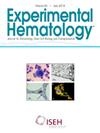The Pluripotent Path to Immunotherapy
IF 2.1
4区 医学
Q2 HEMATOLOGY
引用次数: 0
Abstract
Adoptive cell therapy (ACT) enhances the patient's own immune cells’ ability to identify and eliminate cancer cells. Several immune cell types are currently being applied in autologous ACT, including T cells, natural killer (NK) cells, and macrophages. The cells’ inherent antitumor capacity can be used, or they can be targeted toward tumor-associated antigen through expression of a chimeric antigen receptor (CAR). Although CAR-based ACT has achieved great results in hematologic malignancies, the accessibility of ACT is limited by the autologous nature of the therapy. Induced pluripotent stem cells (iPSCs) hold the potential to address this challenge, because they can provide an unlimited source for the in vitro generation of immune cells. Various immune subsets have been generated from iPSC for application in ACT, including several T-cell subsets (αβT cells, mucosal-associated invariant T cells, invariant NKT [iNKT] cells, and γδT cells), as well as NK cells, macrophages, and neutrophils. iPSC-derived αβT, NK, and iNKT cells are currently being tested in phase I clinical trials. The ability to perform (multiplexed) gene editing at the iPSC level and subsequent differentiation into effector populations not only expands the arsenal of ACT but allows for development of ACT utilizing cell types which cannot be efficiently obtained from peripheral blood or engineered and expanded in vitro.
多能免疫疗法之路
采用细胞疗法(ACT)可增强患者自身免疫细胞识别和消灭癌细胞的能力。目前有几种免疫细胞类型被应用于自体细胞疗法,包括 T 细胞、自然杀伤(NK)细胞和巨噬细胞。这些细胞可以利用其固有的抗肿瘤能力,也可以通过表达嵌合抗原受体(CAR)靶向肿瘤相关抗原。虽然基于 CAR 的 ACT 疗法在血液恶性肿瘤中取得了巨大的成果,但这种疗法的自体性质限制了 ACT 的可及性。诱导多能干细胞(iPSCs)为体外生成免疫细胞提供了无限的来源,因此有可能解决这一难题。从 iPSC 中生成的各种免疫亚群已应用于 ACT,包括几种 T 细胞亚群(αβT 细胞、粘膜相关不变 T 细胞、不变 NKT(iNKT)细胞和 γδT 细胞)以及 NK 细胞、巨噬细胞和中性粒细胞。在 iPSC 水平进行(多重)基因编辑并随后分化为效应细胞群的能力,不仅扩大了 ACT 的武器库,而且允许利用无法从外周血中有效获取或在体外设计和扩增的细胞类型开发 ACT。
本文章由计算机程序翻译,如有差异,请以英文原文为准。
求助全文
约1分钟内获得全文
求助全文
来源期刊

Experimental hematology
医学-血液学
CiteScore
5.30
自引率
0.00%
发文量
84
审稿时长
58 days
期刊介绍:
Experimental Hematology publishes new findings, methodologies, reviews and perspectives in all areas of hematology and immune cell formation on a monthly basis that may include Special Issues on particular topics of current interest. The overall goal is to report new insights into how normal blood cells are produced, how their production is normally regulated, mechanisms that contribute to hematological diseases and new approaches to their treatment. Specific topics may include relevant developmental and aging processes, stem cell biology, analyses of intrinsic and extrinsic regulatory mechanisms, in vitro behavior of primary cells, clonal tracking, molecular and omics analyses, metabolism, epigenetics, bioengineering approaches, studies in model organisms, novel clinical observations, transplantation biology and new therapeutic avenues.
 求助内容:
求助内容: 应助结果提醒方式:
应助结果提醒方式:


